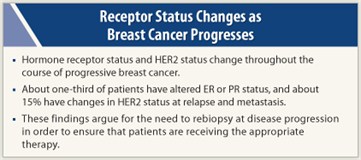Oncologists should be aware that common clinical tumor markers (denoting hormonal and HER2 status) change as breast cancer progresses, because these changes can affect treatment selection. Estrogen receptor (ER), progesterone receptor (PR), and HER2 receptor status was changed from the time of the primary tumor diagnosis to relapse diagnosis in tumor tissue from the same individual, according to a study presented at the 2011 European Multidisciplinary Cancer Congress in Stockholm.
 “At present, clinical management of metastatic breast cancer patients is frequently based on primary tumor marker status. Importantly, our study showed that at least one in three breast cancer patients have altered ER or PR receptor status, and 15% of patients changed HER2 status during the course of disease,” said Linda Lindström, MSc, PhD, Department of Oncology-Pathology, Karolinska Institutet, Stockholm. “These findings suggest the need for clinical rebiopsy at relapse and metastasis, to enable optimized treatment decisions for each patient,” she stated.
“At present, clinical management of metastatic breast cancer patients is frequently based on primary tumor marker status. Importantly, our study showed that at least one in three breast cancer patients have altered ER or PR receptor status, and 15% of patients changed HER2 status during the course of disease,” said Linda Lindström, MSc, PhD, Department of Oncology-Pathology, Karolinska Institutet, Stockholm. “These findings suggest the need for clinical rebiopsy at relapse and metastasis, to enable optimized treatment decisions for each patient,” she stated.
Study Specifics
The study was based on a cohort of 1,010 patients with breast cancer in the Stockholm health-care region who relapsed between January 1, 1997, and December 1, 2007. Biochemical or immunohistochemical/immunocytochemical (IHC/ICC) assays were used to determine ER, PR, and HER2 status, which was also confirmed by fluorescence in situ hybridization (FISH) for HER2 +2 and +3 patients.
In 459, 430, and 104 patients, ER, PR, and HER2 information was assessed from both primary tumor and first relapse, revealing a change in 32.4%, 40.7%, and 14.5% of patients, respectively. In addition, ER status was assessed in 119 patients and PR status in 116 patients in multiple relapse sites. These markers were unstable throughout tumor progression as well as during advanced-stage disease. One-third of patients had discordant ER status between different relapse sites, whereas 36.1% were classified as stable ER-positive and 30.3% were stable ER-negative; 16% of patients changed from ER-positive to ER-negative, 12.6% changed from ER-negative to ER-positive, and 5% went back and forth throughout tumor progression.
 “Loss of ER status generally means that the tumor is resistant to endocrine therapy, whereas a gain in ER expression in the relapse setting would introduce an additional choice of therapy that could affect survival,” Dr. Lindström pointed out. “Women with ER-positive primary tumors changing to ER-negative compared with women with stable ER-positive disease had a significantly increased (by almost 50%) risk of dying,” she added. Further, she said that the findings suggest that hormonal therapy promotes loss of ER expression during disease progression.
“Loss of ER status generally means that the tumor is resistant to endocrine therapy, whereas a gain in ER expression in the relapse setting would introduce an additional choice of therapy that could affect survival,” Dr. Lindström pointed out. “Women with ER-positive primary tumors changing to ER-negative compared with women with stable ER-positive disease had a significantly increased (by almost 50%) risk of dying,” she added. Further, she said that the findings suggest that hormonal therapy promotes loss of ER expression during disease progression.
Future Research
Dr. Lindström and coauthors are planning a prospective trial following a group of patients with breast cancer and assessing standard clinical markers throughout disease progression. “It is important in this era of new and targeted therapies to make sure that the correct treatment is given throughout the disease,” she commented. “An additional advantage of rebiopsies at relapse and metastasis is that they could detect other primary cancers, or benign lesions, which could spare patients inappropriate or unnecessary therapies.”
Dr. Lindström said that tumor instability is a promising area of research, not just for breast cancer but perhaps other cancers as well. She added that choice of therapy, patient characteristics, and inherent behavior of tumors may be shared by different tumor types. ■
Disclosure: Dr. Lindström reported no potential conflicts of interest.
Expert Point of View: U.S. Perspective
Expert Point of View: European Perspective
Reference
1. Lindström LS, Karlsson E, Wilking U, et al: Clinically used breast cancer markers are heterogeneous throughout tumour progression. 2011 European Multidisciplinary Cancer Congress. Abstract 5024. Presented September 25, 2011.


 ECCO President Michael Baumann, MD, said that the findings on changes in receptor status throughout breast cancer progression were of major importance, “because many patients do not receive optimal treatment for their disease. The price of regular biopsies may seem high, but in the long run they...
ECCO President Michael Baumann, MD, said that the findings on changes in receptor status throughout breast cancer progression were of major importance, “because many patients do not receive optimal treatment for their disease. The price of regular biopsies may seem high, but in the long run they...